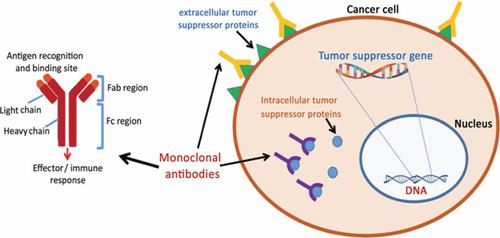Current Topics in Medicinal Chemistry ( IF 2.9 ) Pub Date : 2020-07-31 , DOI: 10.2174/1568026620666200616133814 Rakesh Kumar Mishra 1 , Anas Ahmad 1 , Akshay Vyawahare 1 , Ajay Kumar 1 , Rehan Khan 1

|
Monoclonal antibodies (mAbs) have always provided outstanding therapeutic arsenal in the treatment of cancer, be it hematological malignancies or solid tumors. Monoclonal antibodies mediated targeting of cancer genes in general and tumor-suppressor genes, in particular, have appreciably allowed the possibilities of trafficking these antibodies to specific tumor mechanisms and aim for the pin-point maneuvered tumor treatment strategies. The conventional cancer treatment options are associated with enormous limitations like drug resistance, acute and pan-toxic side effects and collateral damage to other unrelated cells and organs. Therefore, monoclonal antibody-mediated treatments have some special advantages of specific targeting of cancer-related genes and minimizing the off-target side effects. A large number of monoclonal antibody-mediated treatment regimen viz. use of immunoconjugates, clinically targeting TGFβ with pan-TGFβ monoclonal antibodies, p53 by its monoclonal antibodies and EGFRtargeted monoclonal antibodies, etc. have been observed in the recent past. In this review, the authors have discussed some of the significant advances in the context of targeting tumor suppressor genes with monoclonal antibodies. Approximately 250 articles were scanned from research databases like PubMed central, Europe PubMed Central and google scholar up to the date of inception, and relevant reports on monoclonal antibody-mediated targeting of cancer genes were selected. mAb mediated targeting of tumor suppressor genes is a recent grey paradigm, which has not been explored up to its maximum potential. Therefore, this review will be of appreciable significance that it will boost further in-depth understanding of various aspects of mAb arbitrated cancer targeting and will warrant and promote further rigorous research initiatives in this regard. The authors expect that this review will acquaint the readers with the current status regarding the recent progress in the domain of mAbs and their employability and targetability towards tumor suppressor genes in anti-cancer therapeutics.
中文翻译:

了解针对靶向肿瘤抑制基因激活的单克隆抗体。
单克隆抗体(mAbs)一直为血液系统恶性肿瘤或实体瘤的癌症治疗提供出色的治疗手段。单克隆抗体介导的针对一般癌症基因和肿瘤抑制基因的靶向,特别是已经使将这些抗体转运到特定肿瘤机制的可能性有了明显的发展,并瞄准了精确的机动性肿瘤治疗策略。常规的癌症治疗选择伴随着巨大的局限性,例如耐药性,急性和泛毒性副作用以及对其他无关细胞和器官的附带损害。因此,单克隆抗体介导的治疗方法具有特异性靶向癌症相关基因并最大程度降低脱靶副作用的一些特殊优势。大量单克隆抗体介导的治疗方案,即。最近已经观察到使用免疫缀合物,在临床上用泛-TGFβ单克隆抗体靶向TGFβ,通过其单克隆抗体p53和靶向EGFR的单克隆抗体等。在这篇综述中,作者讨论了在用单克隆抗体靶向抑癌基因的背景下的一些重要进展。截至成立之日,已从PubMed Central,欧洲PubMed Central和Google Scholar等研究数据库中扫描了约250篇文章,并选择了有关单克隆抗体介导的靶向癌症基因的相关报告。mAb介导的肿瘤抑制基因靶向是最近的灰色范例,尚未对其最大潜力进行探索。因此,此次审查具有重要意义,它将促进对mAb仲裁的癌症靶向的各个方面的进一步深入了解,并在此方面有必要并促进进一步的严格研究计划。作者期望,本综述将使读者了解mAbs领域的最新进展及其在抗癌疗法中对肿瘤抑制基因的可利用性和靶向性的当前状态。











































 京公网安备 11010802027423号
京公网安备 11010802027423号